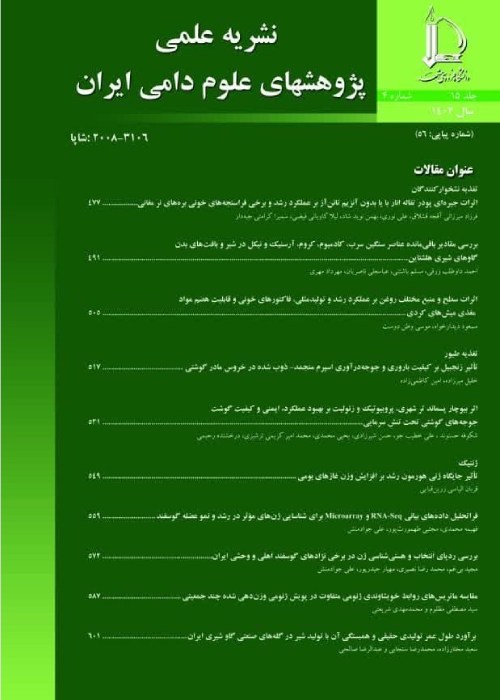Feeding Value of Silybum marianum for Sheep and its Effect on Fiber and Protein Digestion
Author(s):
Abstract:
Introduction Due to scarcity of forage and water resources and high feed prices in Iran, it seems that the utilization of native and cheap forage resources for ruminants is important. The Milk thistle (Silybum marianum) is distributed in different regions of Iran included: Gonbad Kavoos, Gorgan, Nodeh Kalardasht, Dareh Hezareh, Dasht Mugan, Poshtkoh, Mollassani, Shush, Hamidieh, Ramhormuz, Izeh and Kazeroon. The Silybum marianum seed extract and whole plant contain many compounds including Silybin A and B, Silychristin, Apigenin, deoxy silydianin (flavonolignans). Seeds of this plant has about 20 to 25 percent oil, which oleic acids (31.85 %), linoleic acid (45.36 % percent) and palmitic acid (8.25 %) are the major fatty acids of Silybum marianum seed. Also, the Silybum marianum contains flavonoids and anti-nutritional compounds such as tannins and nitrates. Tannins, unsaturated oils and other anti-nutritional compounds may have negative effects on the digestion of fiber and protein fractions. Tannins can make complexes with large number of nutrients, such as carbohydrates, proteins, bacterial cell membrane protein and carbohydrates, and even digestive enzymes. The Silybum marianum plants are native to northern areas of Ahvaz and abundantly growth as self-propelled. The farm animals in these area (sheep, goats, camels, water buffalo and native cows, etc.) graze this plant as well as the manual feeding, but there is little known about its effects on the health, performance and digestibility of nutrients (in particular on the fiber and protein, due to existing the tannin and unsaturated oils in it) in those animals, and no research work has been done about Silybum marianum. Therefore, this experiment was conducted to determine the feeding value of Silybum marianum and to measure its effects on rumen fermentation and digestion of fiber (straw) and protein constituents (soybean meal) feedstuff in Arabi sheep.
Materials and Methods Twelve male Arabi sheep with a mean body weight of 37±1.2 kg were allocated to four dietary treatments in a completely randomized design. Experimental diets were including control diet (without Silybum marianum) and diets supplemented with different levels of Silybum marianum (50, 100 and 200 g/kg as diets 2, 3 and 4 respectively) that fed for 84 days. Dry matter intake, digestibility, fermentation parameters and blood metabolites were determined. Digestibility and gas production potential of wheat straw and soybean meal incubated with rumen fluid of sheep fed diets containing Silybum marianum were examined. The in vitro digestibility was measured by the two-step method. Gas Production was analyzed in triplicate as described by the Menke and Steingass.
Materials and Methods Twelve male Arabi sheep with a mean body weight of 37±1.2 kg were allocated to four dietary treatments in a completely randomized design. Experimental diets were including control diet (without Silybum marianum) and diets supplemented with different levels of Silybum marianum (50, 100 and 200 g/kg as diets 2, 3 and 4 respectively) that fed for 84 days. Dry matter intake, digestibility, fermentation parameters and blood metabolites were determined. Digestibility and gas production potential of wheat straw and soybean meal incubated with rumen fluid of sheep fed diets containing Silybum marianum were examined. The in vitro digestibility was measured by the two-step method. Gas Production was analyzed in triplicate as described by the Menke and Steingass.
Results And Discussion
The results showed that dry matter intake, rumen fermentation parameters and blood metabolites were significantly affected by the experimental diets (PKeywords:
Language:
Persian
Published:
Iranian Journal of Animal Science Reaserch, Volume:7 Issue: 3, 2015
Pages:
267 to 277
magiran.com/p1518131
دانلود و مطالعه متن این مقاله با یکی از روشهای زیر امکان پذیر است:
اشتراک شخصی
با عضویت و پرداخت آنلاین حق اشتراک یکساله به مبلغ 1,390,000ريال میتوانید 70 عنوان مطلب دانلود کنید!
اشتراک سازمانی
به کتابخانه دانشگاه یا محل کار خود پیشنهاد کنید تا اشتراک سازمانی این پایگاه را برای دسترسی نامحدود همه کاربران به متن مطالب تهیه نمایند!
توجه!
- حق عضویت دریافتی صرف حمایت از نشریات عضو و نگهداری، تکمیل و توسعه مگیران میشود.
- پرداخت حق اشتراک و دانلود مقالات اجازه بازنشر آن در سایر رسانههای چاپی و دیجیتال را به کاربر نمیدهد.
In order to view content subscription is required
Personal subscription
Subscribe magiran.com for 70 € euros via PayPal and download 70 articles during a year.
Organization subscription
Please contact us to subscribe your university or library for unlimited access!



